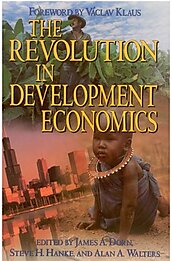For decades, development economists believed that central planning, not economic freedom, was the key to economic growth in developing countries. In 1956 Gunnar Myrdal, winner of the Nobel Prize in economics in 1974, wrote, “The special advisers to underdeveloped countries who have taken the time and trouble to acquaint themselves with the problem all recommend central planning as the first condition of progress.”
While the argument that socialism is the key to growth in the developing world appears obviously unreasonable today — given the collapse of command-and-control economies around the globe—it was, when Myrdal wrote, the academic consensus. Only a few economists doubted such arguments and proposed alternatives. Foremost among them was Peter Bauer, author of such classics as The Economics of Under-Developed Countries and Dissent on Development.
This book contains 20 essays, many of which were originally published in the Cato Journal, and a foreword by Václav Klaus, former prime minister of the Czech Republic.
In his essay “Institutions, Ideology, and Economic Performance,” Nobel laureate Douglass C. North introduces the idea of “adaptive efficiency,” which judges markets on how well they adapt to change. Crucial to the adaptive process are strictly enforced property rights and the rule of law, which “encourage trials and eliminate errors.” “For the Third World and socialist economies,” writes North, “the consequences of the institutional framework have been to realize only very partially the productive potential of new technology.”
Peter Bauer, in “Western Subsidies and Eastern Reform,” maintains that the West could do far more to increase economic growth in the former Soviet bloc countries by simply reducing or eliminating trade barriers against exports from those countries than by dispensing more foreign aid. Indeed, he argues, aid might have a counterproductive effect, since “external subventions promote or reinforce the belief that economic improvement depends on outside forces, not on domestic effort. Subsidies encourage governments to seek foreign assistance through beggary or blackmail instead of making changes at home. External subsidies have also helped to sustain governments, especially in Africa, whose policies have proved so damaging that only the subsidies have enabled them to remain in power and continue with such destructive policies.”
In his essay “Economic Inequality and the Quest for Social Justice,” the late Karl Brunner argues that free-market development policies and centrally planned development policies are based on two competing theories of justice. The free-market approach guarantees that rights are protected and maintains that the products of voluntary actions by players in a market economy are necessarily just, even if the distribution might be unequal. The centrally planned approach, in contrast, looks only at the end state. If, in the end, the distribution of goods is not egalitarian, then the outcome is unjust. However, as Brunner points out, in order to achieve an egalitarian distribution you must violate private property rights and the rule of law, which are central to economic development. “We need to emphasize once more,” concludes Brunner, “that a society guided by the egalitarian principle will necessarily develop institutions of control and management that ultimately maintain substantial inequality of economic status and political power.”
Other contributors to the volume include the late Julian L. Simon of the University of Maryland, Deepak Lal of the University of California at Los Angeles, and Alvin Rabushka of the Hoover Institution.
